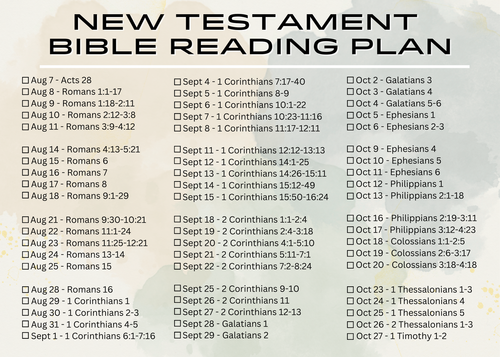Lawsuits, Sexual Immorality, And Marriage
1 Corinthians 6:1-7:16
Believers should resolve disputes among themselves instead of taking them to secular courts. This is because, as Christians, we are destined to judge the world alongside Christ (cf. Dan. 7:22; Matt. 19:28; Rev. 20:4) in the final judgment. While the meaning of "judging angels" is not entirely clear, Christians may participate in judging fallen angels during the final judgment. Regardless of the outcome of a legal case, the church always suffers when disputes are not settled internally.
Paul reinforces his main point by cautioning the Corinthian believers that they cannot lead a persistently sinful lifestyle without facing the consequences. Engaging in unrighteous behavior is incompatible with being a citizen of God's kingdom. Such lifestyles are not what define the citizens of God's kingdom. Paul presents a non-exhaustive list of vices, including sexual immorality, idolatry, adultery, homosexuality, theft, greed, drunkenness, reviling, and swindling. Believers are not inherently superior to unbelievers. The sins that used to characterize unbelievers are the same sins that once characterized those who are now believers. The only difference is that God has intervened.
The idea that Paul is arguing against Christians' right to engage in sexual relations with prostitutes does not naturally follow from considering what is lawful and profitable. It is essential to recognize that the physical body holds significance in the eyes of God. The notion that only the soul matters while the physical body does not is rooted in pagan beliefs. As believers, we are united with Christ and should live accordingly. This means actively avoiding immoral sexual behavior. Paul's argument challenges the belief that all sins are external to the physical body, suggesting instead that immoral sex is a sin against one's own body. As a Christian, your body is a temple of the Holy Spirit. It is not your own but rather belongs to God, who paid for it through the sacrifice of His Son. This theological understanding has practical implications. It is inconceivable to pursue immoral sexual behavior in the Most Holy Place. However, Paul now asserts that your physical body is the Most Holy Place. Therefore, believers must not defile it but rather keep it pure, as it is a sacred space.
The Corinthians also raised some concerns in their correspondence. In response, Paul clarifies that it is beneficial for a husband and wife to engage in regular sexual intimacy as a means to prevent sexual immorality. Paul does not imply that every individual must marry but instead emphasizes that God intended sex to be exclusively enjoyed between a husband and wife. Any other form of sexual activity is considered immoral, given the historical and cultural context of Corinth. To give "conjugal rights" means to share sex with one's spouse. What Paul says about the husband is shockingly countercultural: a husband's wife has authority over his body. His marital duty is to meet her sexual needs. That implies that a husband and wife should enjoy sex exclusively with each other.
Paul has a category for a possible exception with four conditions:
Not all Christian adults are required to marry according to God. On the contrary, singleness is a valid and respectable option that Paul himself prefers. The idea that both marriage and singleness are gifts from God is conveyed by the phrase, "Each has his own gift from God." This went against the cultural norms of Roman society, which expected all adults to marry. Roman law even penalized those who chose not to marry, including those who were divorced or widowed. Paul explains that it is ideal for this group to remain single and not pursue (re)marriage. However, he acknowledges that marrying is better than engaging in immoral sexual behavior.
Paul addresses the issue of divorce. The ideal situation is for a husband and wife to remain married and neither to divorce the other. This passage raises at least three questions:
When a non-Christian spouse becomes a believer, but their partner does not, it raises the question of how to proceed. It is important for a Christian spouse not to divorce simply because their partner is not a Christian. In such cases, the Christian spouse brings a sense of holiness to the family, benefiting both the non-Christian spouse and the children. However, it should be noted that this does not guarantee that the rest of the family will become Christians. Instead, the Christian spouse, being the temple of the Holy Spirit, positively influences the entire household. Paul does include an exception, stating that the non-Christian spouse should consent to live with the Christian spouse. However, physically deserting a spouse is grounds for divorce, as it violates the marriage covenant. A person is free to remarry after a divorce with a biblical warrant.
Paul reinforces his main point by cautioning the Corinthian believers that they cannot lead a persistently sinful lifestyle without facing the consequences. Engaging in unrighteous behavior is incompatible with being a citizen of God's kingdom. Such lifestyles are not what define the citizens of God's kingdom. Paul presents a non-exhaustive list of vices, including sexual immorality, idolatry, adultery, homosexuality, theft, greed, drunkenness, reviling, and swindling. Believers are not inherently superior to unbelievers. The sins that used to characterize unbelievers are the same sins that once characterized those who are now believers. The only difference is that God has intervened.
The idea that Paul is arguing against Christians' right to engage in sexual relations with prostitutes does not naturally follow from considering what is lawful and profitable. It is essential to recognize that the physical body holds significance in the eyes of God. The notion that only the soul matters while the physical body does not is rooted in pagan beliefs. As believers, we are united with Christ and should live accordingly. This means actively avoiding immoral sexual behavior. Paul's argument challenges the belief that all sins are external to the physical body, suggesting instead that immoral sex is a sin against one's own body. As a Christian, your body is a temple of the Holy Spirit. It is not your own but rather belongs to God, who paid for it through the sacrifice of His Son. This theological understanding has practical implications. It is inconceivable to pursue immoral sexual behavior in the Most Holy Place. However, Paul now asserts that your physical body is the Most Holy Place. Therefore, believers must not defile it but rather keep it pure, as it is a sacred space.
The Corinthians also raised some concerns in their correspondence. In response, Paul clarifies that it is beneficial for a husband and wife to engage in regular sexual intimacy as a means to prevent sexual immorality. Paul does not imply that every individual must marry but instead emphasizes that God intended sex to be exclusively enjoyed between a husband and wife. Any other form of sexual activity is considered immoral, given the historical and cultural context of Corinth. To give "conjugal rights" means to share sex with one's spouse. What Paul says about the husband is shockingly countercultural: a husband's wife has authority over his body. His marital duty is to meet her sexual needs. That implies that a husband and wife should enjoy sex exclusively with each other.
Paul has a category for a possible exception with four conditions:
- They must agree to abstain.
- The abstaining must be short—not an indefinite period.
- The purpose of abstaining must be to focus on praying.
- The result must be that they again engage in regular sex so that Satan will not use their abstaining to tempt them toward immoral sex.
Not all Christian adults are required to marry according to God. On the contrary, singleness is a valid and respectable option that Paul himself prefers. The idea that both marriage and singleness are gifts from God is conveyed by the phrase, "Each has his own gift from God." This went against the cultural norms of Roman society, which expected all adults to marry. Roman law even penalized those who chose not to marry, including those who were divorced or widowed. Paul explains that it is ideal for this group to remain single and not pursue (re)marriage. However, he acknowledges that marrying is better than engaging in immoral sexual behavior.
Paul addresses the issue of divorce. The ideal situation is for a husband and wife to remain married and neither to divorce the other. This passage raises at least three questions:
- Why does Paul use the phrase "Not I, but the Lord" here and then say "I, not the Lord" in verse 12? Paul is not suggesting that verses 10-11 are authoritative while verses 12-16 are not, but instead expressing his fallible opinion. It is important to note that the apostle Paul's instruction is God-breathed. Jesus did not address this issue because he primarily taught Jews who married fellow Jews. However, Paul now addresses Christian Gentiles married to non-Christian Gentiles, presenting a new situation.
- Is there a distinction between the terms "separate" and "divorce" in the concluding phrases of verses 10-11? No, they are essentially the same. Paul would not acknowledge the technical classification of "separation but not divorce" in certain cultures today.
- According to Paul, when someone divorces their spouse, they face two choices: either remain unmarried or reconcile with their spouse. However, these options seem only to apply if the divorce is not based on biblical grounds. If the divorce is based on biblical grounds, other options are available.
When a non-Christian spouse becomes a believer, but their partner does not, it raises the question of how to proceed. It is important for a Christian spouse not to divorce simply because their partner is not a Christian. In such cases, the Christian spouse brings a sense of holiness to the family, benefiting both the non-Christian spouse and the children. However, it should be noted that this does not guarantee that the rest of the family will become Christians. Instead, the Christian spouse, being the temple of the Holy Spirit, positively influences the entire household. Paul does include an exception, stating that the non-Christian spouse should consent to live with the Christian spouse. However, physically deserting a spouse is grounds for divorce, as it violates the marriage covenant. A person is free to remarry after a divorce with a biblical warrant.





Recent
Archive
2023
January
Happy New Year!He Will Save His People From Their SinsMy Beloved SonTemptation And MinistryThe SermonLeaving, Lying, Limits, Love, Largesse, and The Lord's PrayerTreasure, Anxiety, and JudgmentAstonishing AuthorityStorms, Demons, and HealingJesus Is CompassionateHis Eye Is On The SparrowSwords, Rewards, and MessengersThe Lord of the SabbathBlasphemy, Bad Trees, Signs, and FamilyStories, Sowers, and SoilsParables, Hidden Treasure, and RejectionFame, Food, Fear, Faith, and FringeReal Issues And The Power Of GodDying To Find LifeLike The SunChildren, Temptation, Sheep, And ForgivenessMarriage, Kids, And MoneyTo Serve And Give His Life
February
The ArrivalStories That StingQuestion TrapsHidden Motives And LamentThe End...?UnexpectedReady?Punishment, The Plot, And PerfumeTreachery, Passover, and The CupBetrayal, Injustice, And DenialThe Field Of Blood And The GovernorCrucifixion And DeathAll AuthorityMark—The Beginning Of The GospelHealing, Preaching, And The Forgiveness Of SinEating With Tax Collectors, Fasting, The Sabbath, And An Escape BoatThe Twelve, Blasphemy, Family, And A ParableParables And PowerA Different Kind Of StormPower Had Gone Out
March
Death, Hunger, And MiraclesCommandment Or TraditionDo You Not Yet Understand?The Christ And A Glimpse Of His GloryUnbelief, Confusion, And SinDivorce, Children, And PossessionsTo Give His Life As A RansomHosannaThe Rejected Stone, Taxes, And The Great CommandmentDestruction And The EndNo One Knows, An Anointing, And A Promise To BetrayPassover And GethsemaneThe Kiss, Arrest, And DenialPilate, Simon, And The CrucifixionDeath, Burial, Resurrection, And What\'s NextTheophilus And A Visit From GabrielMary And The MagnificatBenedictusThe Arrival And The ShepherdsSimeon, Anna, And The SpiritFruits Keeping With Repentance And BaptismThe Wilderness, Nazareth, And CapernaumSimon's Mother-In-Law, Fishing, A Leper, And Sins
April
Tax Collectors, Fasting, Sabbath Controversies, And The TwelveWhy Do You Call Me Lord, Lord?Jesus Marveled, A Raised Son, And QuestionsA Sinful Woman And A ParableObeying The Word, A Storm, And DemonsTwelve Years, Twelve Apostles, And SpeculationGreater, Costly, And GloryNot Getting It, The Cost, And AppointedWoes, Neighbors, And What Is NecessaryHelp Us Pray And A Divided Kingdom?Signs, Lights, And WoesHypocrisy, Fear, A Fool, And AnxietyParables, Division, And The TimesWarnings, A Daughter Of Abraham, And Jerusalem, JerusalemA Son Or An Ox, Parties, And DiscipleshipLost ThingsThe Dishonest Manager, The Law, And Anguish In This FlameMillstones And Mustard SeedsPersistent Prayer, Humility, A Childlike Faith, And The Rich RulerEverything That Is Written, A Blind Beggar, And A Wee Little Man
May
A Parable, A Colt, A Prophecy, And A CleansingAuthority, Wicked Tenants, And TaxesThings To Beware Of And WidowsDestruction, Persecution, The Son Of Man, And WatchingThe Plot, Betrayal, Lord's Supper, And Inappropriate BehaviorPrediction, Fulfillment, Agony, Betrayal, And DenialMistreated, Taken Before The Council, Pilate, Herod, And Delivered To Be CrucifiedCrucifixion, Death, And BurialHe Is Not HereDisbelieved For JoyIn The Beginning…The Lamb Of God And A WeddingZeal, What's Inside, And Born AgainHe Must Increase
Categories
no categories
Tags
no tags
